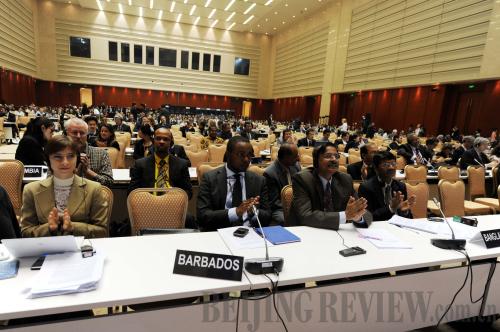|
 |
|
FIGHTING CLIMATE CHANGE: Delegates attend the last plenary session of the UN climate talks in north China's Tianjin Municipality on October 9. The talks helped pave the way for the year-end climate summit in Cancún, Mexico (YUE YUEWEI) |
As global climate negotiators gathered in Tianjin, a port city of north China, they knew exactly what their decisions would mean for the world's future.
Two special working groups under the UN Framework Convention on Climate Change (UNFCCC) and its Kyoto Protocol met side by side on October 4-9 to seek consensus.
The Ad Hoc Working Group on Long-Term Cooperative Action Under the Convention, comprising all 194 parties to the UNFCCC, was tasked to deliver a long-term global approach to the climate challenge. The Ad Hoc Working Group on Further Commitments for Annex I Parties Under the Kyoto Protocol met in parallel to discuss the emissions reduction commitments for the 37 industrialized countries that have ratified the Kyoto Protocol for the period beyond 2012.
This was the fourth and last chance for negotiation this year in the run up to the climate summit to be held in Cancún, Mexico, from November 29 to December 10. The talks were designed to pick up on issues left unresolved at the Copenhagen summit last December and to pave the way for success in Cancún.
A global concern
For countries across the globe, combating climate change is not a matter of choice. Extreme weather events, like crippling mudslides in China, raging forest fires in Russia and devastating storms in Pakistan, serve as reminders of the fact that human survival is already at stake. The question naturally arises: What is being done to avoid a runaway climate disaster?
Under the Kyoto Protocol, the 37 industrialized nations, not including the United States, are obliged to cut their greenhouse gas emissions 5.2 percent from 1990 levels. But the first commitment period of the protocol will expire in 2012, and a second commitment period needs to be finalized.
Last year's Copenhagen summit ended without a legally binding agreement on emissions reduction, leaving major rifts between poor and rich nations unaddressed. The industrialized world pledged to cut emissions 10-20 percent by 2020 from 1990 levels, far short of what is needed to prevent catastrophic global warming. In its most recent report, the Intergovernmental Panel on Climate Change claimed a 25-40-percent cut in emissions from 1990 levels was necessary to halt global warming.
In Copenhagen, developed nations agreed to provide $30 billion from 2010 to 2012 to help their developing counterparts with climate change mitigation and adaptation. They would also boost the aid to $100 billion a year by 2020. However, as months have passed since the Copenhagen summit, it remains unclear how the aid should be used. Some developing countries have also questioned the legitimacy of some of the already-committed funds, saying they may have been transferred from other aid budgets and just "pasted with a climate label."
The Tianjin conference was critical in allowing countries "to identify what is already ripe for adoption in Cancún, and what are those issues that require further conversation," said Christiana Figueres, Executive Secretary of the UNFCCC.
Negotiators produced a draft decision text that will be submitted to the Cancún conference, and they came much closer to working out a new long-term financing plan to cope with climate change, said Figueres.
She said less progress was made in discussions on the continuation of the Kyoto Protocol, but expressed confidence that the issue would make progress in Cancún.
Developed countries should take the lead in deep emissions cuts and climate financing as they have the historical responsibility for climate change, Peter Muteyauli, a Namibian climate negotiator told Beijing Review, on the sidelines of the conference.
In the past, rich nations have largely created the climate crisis, but it is poorer countries that are hit first and hardest, he said.
Instead, developed countries tried to shift the focus by calling for the participation of major developing economies such as China, India and Brazil. This is not in line with the principle of "common but differentiated responsibilities," he said.
Lian Kok Fei, a negotiator from Malaysia, agreed. "Developing countries deserve some space for economic development, and their emissions reductions should be voluntary," he said.
In fact, many developing countries, including China, are already making remarkable contributions and laying the groundwork for wider agreements, he said.
"If we are to make progress in our negotiations, we have to make sure our work is based on the principles and provisions of the convention [UNFCCC] and the Bali Action Plan," said Ambassador Abdullah M. Alsaidi, head of the delegation of Yemen, in a statement on behalf of the Group of 77 and China.
In this regard, ideas and proposals that are inconsistent with these principles and provisions, such as the reclassification of countries and differentiation amongst developing countries, will impede the process, he said.
| 